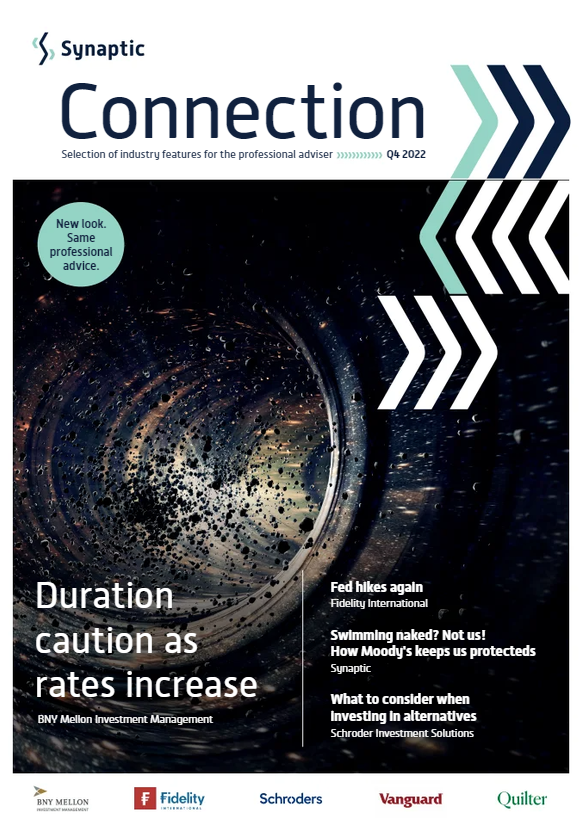In this edition...
- Ignore the Noise and Stick to the Strategy Eric Armstrong, Client Director, Synaptic
- Fed hikes again, but are we passed peak hawkishness? Salman Ahmed, Global Head of Macro and Strategic Asset Allocation, Fidelity International
- Duration caution as rates increase Paul Flood, Head of Mixed Assets Investment Newton Investment Management, part of BNY Mellon Investment Management
- Why investors shouldn’t overreact to talk of a recession Shaan Raithatha, Senior Economist - Vanguard, Europe
- What should I consider when investing in Alternatives in my multi-asset portfolio? Alex Funk, CIO Schroder, Investment Solutions
- Has the world changed? Mark Harris, Portfolio Manager, EPIC Investment Partners
- Swimming naked? Not us. Moody’s keeps us well protected. Eric Armstrong, Client Director, Synaptic
- The high-carbon transition Natasha Landell-Mills, Head of Stewardship, Sarasin & Partners
- Twitter, tech stocks & the untapped monetary potential Richard O’Sullivan, Investment Research Manager, RSMR
- GPUs are driving the future of computing Hamish Chamberlayne, Head of Global, Sustainable Equities
- Impact investing doesn’t mean compromising on returns M&G Investments,
- Quilter: Integrating responsible investment into your advice process Andy Miller, Investment Director Lead, Quilter
- Being green is in fashion Rahab Paracha, Sustainable multi-asset investment specialist, Rathbones
- Growth Investing: why the hunt for outliers remains compelling Stuart Dunbar, Partner, Baillie Gifford & Co
- Freedoms revisited - Where do we go from here? Matt Ward, Communications Director, AKG
AKG published its latest pension freedoms themed industry research paper – this one entitled, ‘Freedoms revisited - Where do we go from here?’ - in July 2022. Here, AKG’s Communications Director, Matt Ward, summarises key points from the paper.
Concerns around inflation and cost of living crisis
This is a very real threat and concern for people across the country. It will have a direct impact on the considerations of pensions customers across age groups, whether in accumulation or decumulation phases. We’ve had such a prolonged period of low inflation that a lack of inflation may be almost baked into people’s assumptions and their positions/plans could be heavily destabilised. The industry needs to be helpful, practical and realistic in the way in which it seeks to educate and address these issues with a wide range of pensions customers.
Impact of inflation and investment volatility on drawdown
From an adviser perspective inflation and investment volatility represent key retirement planning concerns for clients and hence clients will need to be warned about potential impacts. Whilst economic backdrop and markets had been relatively benign since the pension freedoms changes came into force, drawdown investment portfolios are now facing a series of challenges and will need to withstand a period of turbulence. Pension assets, and others where support required, will have to sweat for longer.
Regulatory focus and consistency required
There is a lot riding on the FCA’s body of Consumer Duty work when it comes to pensions. Firstly, it is widely perceived that the regulator has been playing catch up since pension freedoms came into force and so CD needs to help address this ‘gap’. Secondly, outcomes are all-important for pensions customers and these will be challenged by inflation and investment volatility. Thirdly, regulatory change and tinkering is not seen as good for the market. It serves to make adviser businesses nervous. A period of regulatory certainty and consistency would therefore be welcomed.
DB transfers still causing concern and ripples
The DB transfer backdrop is still worthy of reference. It represents both a reputational issue for the industry (the FCA continues to review advice processes and historical cases) and an operational issue in terms of accessing PI cover for adviser firms. Many firms have decided to back away from DB transfers and so this may also create some specialist transfer advice capacity concerns for customers looking for help.
Developing affordable/different advice options
Whilst improvements and efficiencies can always be made to solutions and processes, it is fair to say that the mid to top end of the advice market is well served. But there are most definitely opportunities for the development of more cost effective and transactional advice solutions to fill the gap between guidance and the middle of the advised market. Technology will be a key facilitator to create requisite cost efficiencies and hybrid advice delivery models are likely to emerge which successfully combine elements of both technological, digital and human interaction. The workplace will be a vital ‘development lab’ for such options.
Replenishing advice ranks
Acknowledging that advice capacity may also be challenged over time, given typical age profile of the adviser community, there is an associated requirement to recruit new talent into advice roles. This might be via apprenticeships, academies, careers fairs for first time careerists or helping second careerists to understand opportunities which exist in financial advice.
New client acquisition requirements for firms
The impact of both freedoms and COVID-19 has been felt to be largely positive on adviser’s interaction with existing clients, enabling a deepening of the advice relationship and additional opportunities to prove/provide value. And the enforced eye-opening to remote servicing opportunities has been a revelation. But it has not necessarily been as easy to recruit new clients. Whilst this is a situation that some firms may be comfortable with, there will be many who will need to develop new client acquisition tactics to support future growth. Longer term this will be essential for not only advice provision but also the value of advisory firms. Currently there is a seller’s market for advice firms (lots of consolidator money chasing firms), but this will be eroded if viable longer term client acquisition models aren’t substantiated.
Exploring intergenerational planning opportunities
Pension freedoms has altered the order in which clients might plan to access their pensions and other assets, with inheritance planning considerations becoming a growing factor where clients want to pass money onto family members. For those adviser firms developing servicing propositions in this area there will be a pre-requisite to broaden advice relationships beyond the primary client to spouses and dependants. Development of relationships with Next gen customers might also be facilitated via the family servicing approach.
Ingredients for provider success (consumer expectations)
It was fascinating to see what consumers want from their pension providers. The top trait/quality is ‘Honesty’; Second in order was ‘Value for money’; And selected in joint-third position were ‘Clear communications’ and ‘Transparency’. This sets out a clear agenda. Consumers are throwing down the gauntlet to providers who, whilst aware that these items are of key importance, have typically struggled to consistently showcase such competencies. Ultimately trust in pension providers, and the industry as a whole, can only be established and retained when these key items are being consistently delivered.
Proposition development opportunities
Whilst the development of drawdown products has been the standout area for development since freedoms came into force, the general perception is that the market has been light on innovation. The challenges presented by the economic backdrop and investment volatility may encourage a revisit on proposition development thinking and conditions may permit further consideration of annuities and guaranteed solutions. Digital capability and connectivity between solutions is also still felt to be an area where further improvements can be targeted.
Collaborative and consistent pension industry initiatives and messaging
With customer education and enablement crucial to future levels of pensions engagement, and acknowledging that multiple opportunities exist for companies across financial services, there is a requirement for collaborative and consistent activity to boost things for the greater good. Examples of this might be via collaborative educational efforts between trade bodies and providers, enhanced interaction between MaPS, providers and advisers when raising awareness about guidance, and the roll-out of pensions dashboards when illustrating to customers how they can better understand their aggregated pensions resources.
Closing comments; acknowledging the pace of change – Even in the space of time between the publication of the original AKG paper (July 2022) and the time of going to print in this magazine (December 2022), the pace of change and challenge in the outside world has been relentless.
Against this backdrop, some of the challenges for pensions and retirement are being further exposed and exacerbated. Hence, the impact on those operating in the pensions industry, be they providers or advisers or other pertinent stakeholders, means that all parties need to continue to work hard for the good of pension customers and their associated retirement objectives and outcomes.
Get in touch
For access to its full content, this AKG research paper, sponsored by abrdn and Scottish Widows, can be downloaded at https://www.akg.co.uk/downloads
Sign up for updates
Keep up to speed with everything you need to know each quarter, by email or post.



